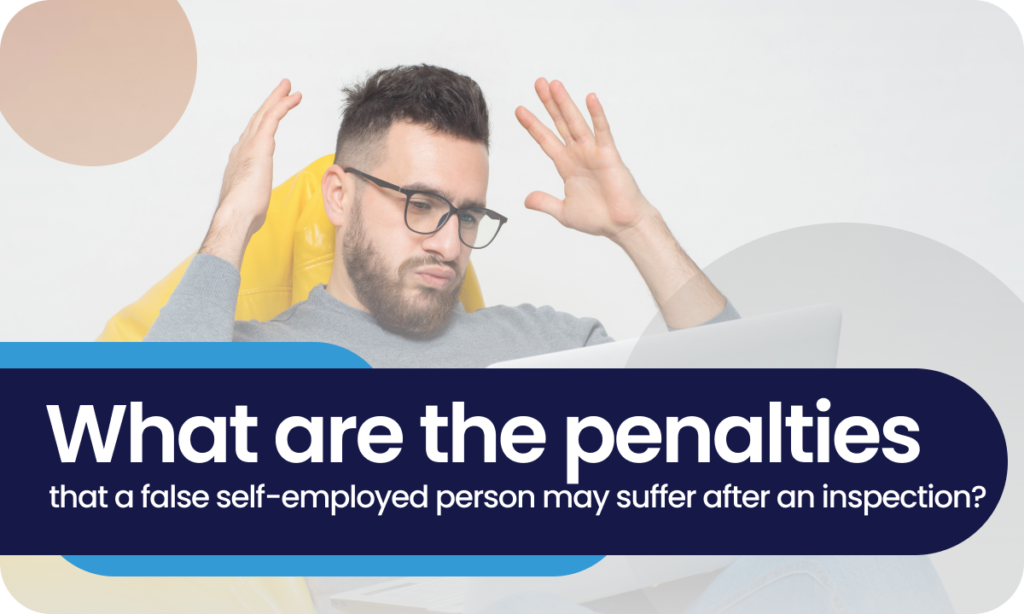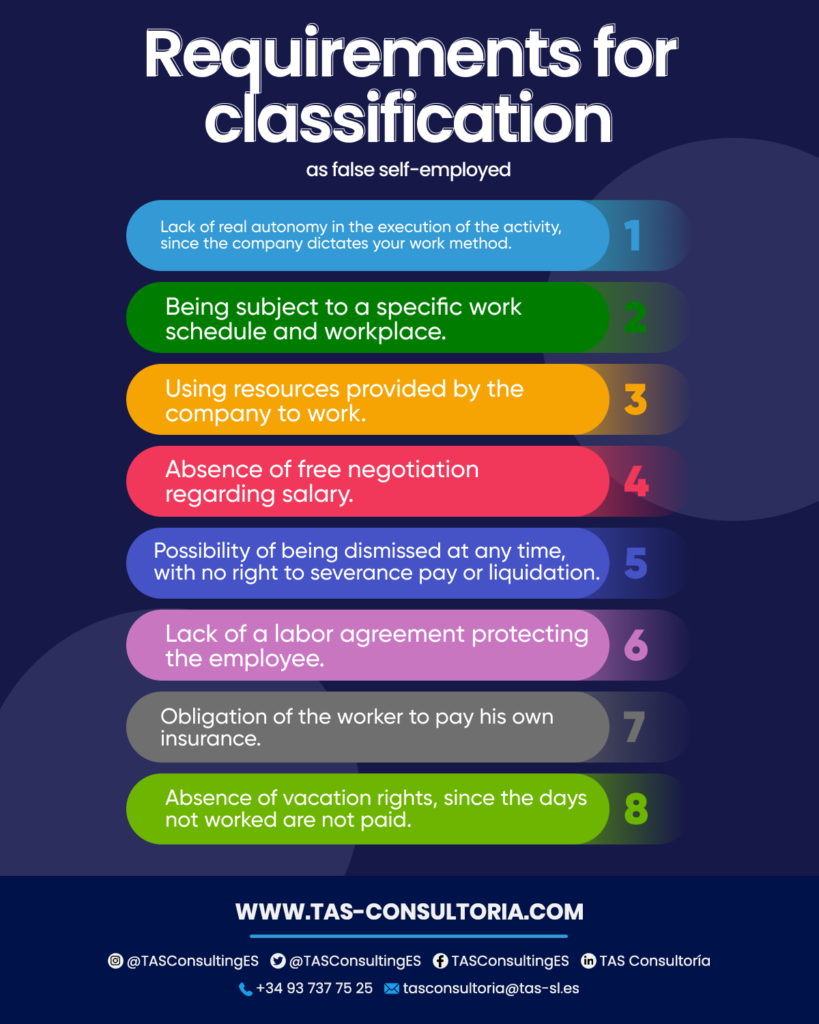
In the Spanish working world, the figure of the “false self-employed” has been a matter of growing concern. Many workers, instead of being salaried employees, are labeled as self-employed, often for no justified reason. This has led to a series of labor inspections to identify and sanction those in this situation. If you want to protect your labor rights or want to better understand this issue, we invite you to read on!
What does it mean to be a false self-employed person?
Under the legal definition, a false self-employed person refers to an individual who is:
- Registered as self-employed.
- Fulfilling the requirements of Hacienda and RETA.
- But who, in reality, performs professional work for a company in a manner similar to a salaried employee.
In other words, he/she is a self-employed person operating under the same conditions as an employee. Only without enjoying the corresponding rights.
In Spain, this situation is surprisingly common, largely due to the difficulties in finding stable employment.
Although it can be beneficial for employers, as they avoid certain liabilities, it is detrimental. For this reason, the authorities are stepping up their punitive measures against companies that employ this practice.
You may also be interested in: Is it possible to hire personnel as a freelancer in Spain?
Why do companies choose to hire a bogus freelancer?
Companies choose to hire bogus freelancers because it provides them with significant advantages. There is no employment relationship beyond the business transaction. Which implies that the laws, rights and obligations typical in the employer-employee relationship do not have to be complied with.
In other words, with the false self-employed, companies save on the worker’s social security contributions. Since the worker assumes the payment of his or her contributions as self-employed.
This means that it is more economical for the employer to have a bogus freelancer instead of a salaried employee. Allowing them to reduce costs and increase their competitiveness.
Likewise, they may terminate the employment relationship without justification or compensation at any time. However, this is achieved at the expense of the employee waiving certain rights. Specifically those that would normally correspond to him/her when performing a job that is clearly similar to that of a salaried employee.
What are the risks associated with false self-employment?
The relationship between employer and employee resembles a balance. In the case of the bogus self-employed, it is tipped completely in favor of the employer.
The risks inherent in being considered false self-employed include:
- Lack of paid vacation entitlement
- No seniority benefits
- Lack of labor protection in case of illness or pregnancy
- Impossibility of exercising the right to strike
On the other hand, the bogus self-employed person is obliged to pay his own contributions as a self-employed person. Therefore, he/she can be “terminated” at any time. In the event of termination, it is often the worker’s own responsibility to find a replacement.
Last but not least, this situation affects retirement. It usually results in the end in a lower retirement benefit than what would be obtained as a salaried worker. Always by opting for lower contributions due to precarious working conditions.
You may also be interested in: Learn about the new quotas for the self-employed 2023-2031
What characteristics classify as false self-employed?
You have already understood what it means to be considered a false self-employed. Now, it is natural to wonder what are the criteria that the legislation establishes for this categorization. Mainly, they are focused on the elements of remuneration, dependence, and dependence on others. We will describe them in detail below:

What are the consequences of hiring a bogus freelancer?
In recent years, laws have become stricter and have established significant penalties for those who hire bogus freelancers. These penalties vary depending on the degree of irregularity detected, and may include the following categories:
- Minimum degree penalty: Range between €3,126 and €6,250.
- Medium penalty: Range between €6,251 and €8,000.
- Maximum penalty: Range between €8,001 and €10,000.
These fines are only part of the consequences in case the use of false freelancers is detected, as other sanctions will also be applied, such as:
- Immediate registration of the employee in the General Social Security System as a salaried employee.
- Payment of all the corresponding contributions for the time the worker would have been employed during the last 4 years.
- An additional surcharge ranging from 100% to 150% on each installment.
- Possible criminal prosecution if unpaid contributions exceed €50,000.
Compensation in case of dismissal of a bogus self-employed person
It should be noted that the company may refuse to pay compensation in the case of a dismissal of a false self-employed person. In spite of this, if he/she decides to take legal action, he/she has the right to claim the compensation due to him/her. Justice supports this claim.
In these situations, the calculation of compensation for a false self-employed person is relatively simple. It is practically identical to that of a salaried employee. The company is obliged to pay 20 days of salary for each year of service of the worker. With a limit of 12 monthly payments.
In addition, it is also possible to claim the reimbursement of the contributions that the self-employed has had to pay. As well as the right to the vacations that would have corresponded to him/her during his/her period of activity.
Ultimately, and again supported by the law, there is the possibility of not only demanding reinstatement in the company. But also to do so as a salaried employee.
You may also be interested in: What does it mean to be an entrepreneur with limited liability?
Conclusion
The penalties for a false self-employed person in Spain can be significant. So it is essential to understand the legal and labor implications. To ensure your business is successful and complies with all tax obligations: we encourage you to explore best practices with our experts via tasconsultoria@tas-sl.es!
Knowing your rights and responsibilities will allow you to build a path to a solid and legal business. Find out more about how to make sure you comply with regulations and grow your business in a sustainable way!




Your email address will not be published .
Required fields are marked with *